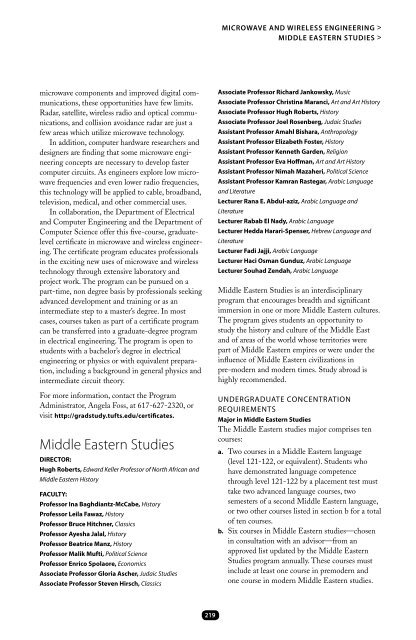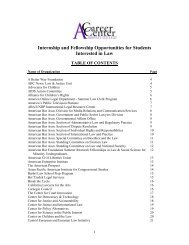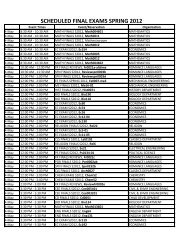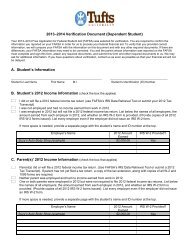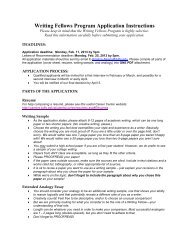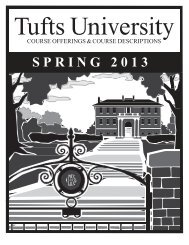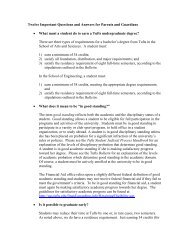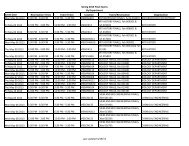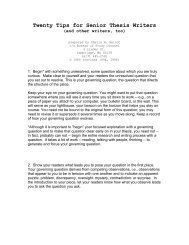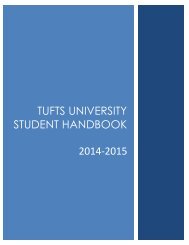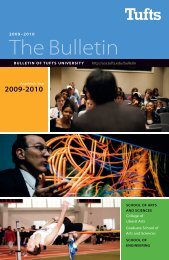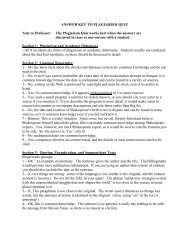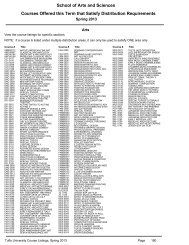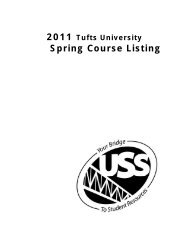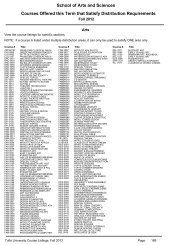2013â2014 The Bulletin - USS at Tufts - Tufts University
2013â2014 The Bulletin - USS at Tufts - Tufts University
2013â2014 The Bulletin - USS at Tufts - Tufts University
You also want an ePaper? Increase the reach of your titles
YUMPU automatically turns print PDFs into web optimized ePapers that Google loves.
Microwave and Wireless Engineering ><br />
Middle Eastern Studies ><br />
microwave components and improved digital communic<strong>at</strong>ions,<br />
these opportunities have few limits.<br />
Radar, s<strong>at</strong>ellite, wireless radio and optical communic<strong>at</strong>ions,<br />
and collision avoidance radar are just a<br />
few areas which utilize microwave technology.<br />
In addition, computer hardware researchers and<br />
designers are finding th<strong>at</strong> some microwave engineering<br />
concepts are necessary to develop faster<br />
computer circuits. As engineers explore low microwave<br />
frequencies and even lower radio frequencies,<br />
this technology will be applied to cable, broadband,<br />
television, medical, and other commercial uses.<br />
In collabor<strong>at</strong>ion, the Department of Electrical<br />
and Computer Engineering and the Department of<br />
Computer Science offer this five-course, gradu<strong>at</strong>elevel<br />
certific<strong>at</strong>e in microwave and wireless engineering.<br />
<strong>The</strong> certific<strong>at</strong>e program educ<strong>at</strong>es professionals<br />
in the exciting new uses of microwave and wireless<br />
technology through extensive labor<strong>at</strong>ory and<br />
project work. <strong>The</strong> program can be pursued on a<br />
part-time, non degree basis by professionals seeking<br />
advanced development and training or as an<br />
intermedi<strong>at</strong>e step to a master’s degree. In most<br />
cases, courses taken as part of a certific<strong>at</strong>e program<br />
can be transferred into a gradu<strong>at</strong>e-degree program<br />
in electrical engineering. <strong>The</strong> program is open to<br />
students with a bachelor’s degree in electrical<br />
engineering or physics or with equivalent prepar<strong>at</strong>ion,<br />
including a background in general physics and<br />
intermedi<strong>at</strong>e circuit theory.<br />
For more inform<strong>at</strong>ion, contact the Program<br />
Administr<strong>at</strong>or, Angela Foss, <strong>at</strong> 617-627-2320, or<br />
visit http://gradstudy.tufts.edu/certific<strong>at</strong>es.<br />
Middle Eastern Studies<br />
DIRECTOR:<br />
Hugh Roberts, Edward Keller Professor of North African and<br />
Middle Eastern History<br />
FACULTY:<br />
Professor Ina Baghdiantz-McCabe, History<br />
Professor Leila Fawaz, History<br />
Professor Bruce Hitchner, Classics<br />
Professor Ayesha Jalal, History<br />
Professor Be<strong>at</strong>rice Manz, History<br />
Professor Malik Mufti, Political Science<br />
Professor Enrico Spolaore, Economics<br />
Associ<strong>at</strong>e Professor Gloria Ascher, Judaic Studies<br />
Associ<strong>at</strong>e Professor Steven Hirsch, Classics<br />
Associ<strong>at</strong>e Professor Richard Jankowsky, Music<br />
Associ<strong>at</strong>e Professor Christina Maranci, Art and Art History<br />
Associ<strong>at</strong>e Professor Hugh Roberts, History<br />
Associ<strong>at</strong>e Professor Joel Rosenberg, Judaic Studies<br />
Assistant Professor Amahl Bishara, Anthropology<br />
Assistant Professor Elizabeth Foster, History<br />
Assistant Professor Kenneth Garden, Religion<br />
Assistant Professor Eva Hoffman, Art and Art History<br />
Assistant Professor Nimah Mazaheri, Political Science<br />
Assistant Professor Kamran Rastegar, Arabic Language<br />
and Liter<strong>at</strong>ure<br />
Lecturer Rana E. Abdul-aziz, Arabic Language and<br />
Liter<strong>at</strong>ure<br />
Lecturer Rabab El Nady, Arabic Language<br />
Lecturer Hedda Harari-Spenser, Hebrew Language and<br />
Liter<strong>at</strong>ure<br />
Lecturer Fadi Jajji, Arabic Language<br />
Lecturer Haci Osman Gunduz, Arabic Language<br />
Lecturer Souhad Zendah, Arabic Language<br />
Middle Eastern Studies is an interdisciplinary<br />
program th<strong>at</strong> encourages breadth and significant<br />
immersion in one or more Middle Eastern cultures.<br />
<strong>The</strong> program gives students an opportunity to<br />
study the history and culture of the Middle East<br />
and of areas of the world whose territories were<br />
part of Middle Eastern empires or were under the<br />
influence of Middle Eastern civiliz<strong>at</strong>ions in<br />
pre-modern and modern times. Study abroad is<br />
highly recommended.<br />
UNDERGRADUATE concentrATION<br />
REQUIREMENTS<br />
Major in Middle Eastern Studies<br />
<strong>The</strong> Middle Eastern studies major comprises ten<br />
courses:<br />
a. Two courses in a Middle Eastern language<br />
(level 121-122, or equivalent). Students who<br />
have demonstr<strong>at</strong>ed language competence<br />
through level 121-122 by a placement test must<br />
take two advanced language courses, two<br />
semesters of a second Middle Eastern language,<br />
or two other courses listed in section b for a total<br />
of ten courses.<br />
b. Six courses in Middle Eastern studies—chosen<br />
in consult<strong>at</strong>ion with an advisor—from an<br />
approved list upd<strong>at</strong>ed by the Middle Eastern<br />
Studies program annually. <strong>The</strong>se courses must<br />
include <strong>at</strong> least one course in premodern and<br />
one course in modern Middle Eastern studies.<br />
219


